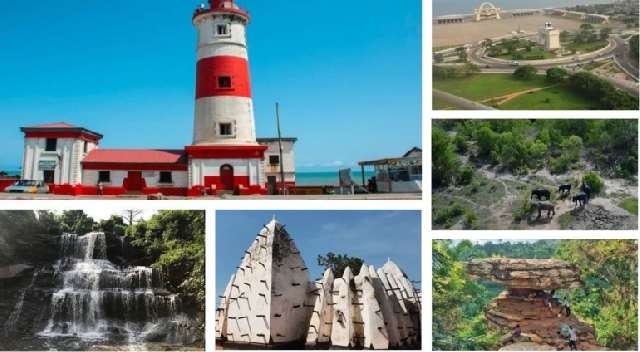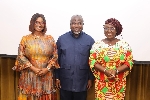GHATOF at 30: Time to awaken the sleeping giant of Ghana’s tourism
 Tourist sites in Ghana
Tourist sites in Ghana
In 1995, when the Ghana Tourism Federation (GHATOF) was established, it was heralded as a unifying force—a beacon of private sector collaboration meant to amplify the voice of tourism operators and steer Ghana’s travel industry toward growth and global competitiveness. Thirty years on, as GHATOF marks its 30th anniversary in 2025, the moment calls not merely for celebration, but for sober reflection.
GHATOF was conceived as the umbrella body for all tourism trade associations in Ghana, bringing together over 20 member associations under one coordinated platform. Its stated mission, according to its own website, is to “champion the cause of private sector tourism associations in Ghana by providing leadership in advocacy, influencing tourism policy development, and pushing for reforms that benefit the industry.” In its heyday, GHATOF lived up to this mission. It was vibrant, vocal and visible—often serving as the bridge between the private sector and government and influencing policies that shaped the nation’s tourism narrative.
But today, that once-powerful federation is a shadow of its former self. The body that was meant to unite and advocate for the sector now barely commands relevance. Its silence on major industry issues has become deafening. The federation that once provided leadership has been reduced to a bystander in the very industry it helped build.
So, what went wrong?
The decline has been gradual but steady. Internal divisions, weak leadership and a lack of strategic vision have eroded GHATOF’s influence. Its largest member, the Ghana Hotels Association, broke away two years ago—a move that underscored not just dissatisfaction, but a loss of confidence in the federation’s ability to lead. Today, while some individual associations within GHATOF continue to pursue their own programmes, the collective body has become dysfunctional and almost irrelevant in shaping the country’s tourism agenda.
And when GHATOF fails, the private sector loses its voice. Without a strong, unified federation to champion industry concerns, government loses the credible partner it needs for effective policy dialogue. The result? An industry caught in a leadership vacuum—where the private sector is disorganised and the public sector remains uncoordinated.
Elsewhere on the continent, similar federations have proven what strong, visionary leadership can achieve. Kenya’s Tourism Federation, though composed of just eight member associations, operates as a formidable entity that effectively engages government and protects the interests of the sector. In South Africa, the Tourism Business Council has emerged as one of Africa’s finest models of private-sector organisation, influencing tourism policy at the highest level and commanding both national and international respect.
Ghana’s tourism sector deserves no less.
If GHATOF is to be taken seriously again, it must first look inward. The time has come for a new generation of leadership—one that is dynamic, transparent and forward-thinking. The “old guard” that has presided over its decline must make way for fresh energy and innovative minds who understand the modern tourism landscape. The industry has evolved; the challenges are different; and the expectations are higher. GHATOF cannot continue with a “business as usual” attitude and expect a different outcome.
The federation needs to reinvent itself as a credible, proactive institution that truly represents its members. It must rebuild trust, strengthen collaboration and position itself as the heartbeat of Ghana’s tourism advocacy. Only then can it effectively push for policy reforms, champion standards and lead Ghana’s tourism sector into the competitive arena of African and global tourism.
After 30 years, GHATOF stands at a crossroads: it can either continue to drift into irrelevance or awaken the sleeping giant within. Ghana’s tourism potential is immense, and the country is on the cusp of a major tourism resurgence. But without a strong, united and visionary GHATOF, that resurgence risks being fragmented and short-lived.
Thirty years is a long time to be in a state of inertia. It’s time for GHATOF to rise, rebrand and reclaim its rightful place as the true voice of Ghana’s tourism industry.
The writer, Samuel Obeng Appah is a passionate advocate for tourism and travel
Source: Samuel Obeng Appah
Trending Entertainment

Filling international venues more important than Grammys, says Ko-Jo Cue
17:50
Ghana Tourism Authority announces 54 finalists for 2025 National Tourism Awards
13:52
Rev. Josh Laryea questions the direction of Ghanaian gospel music
11:04
Lumba's German wife and elder sister appeal to authorities to probe singer's death
00:58
MoTCCA engages GRA to address taxation challenges in creative industry
00:27
Ko-Jo Cue: Rap star takes full responsibility for his stunted success, citing fear of fame
18:28
Ko-Jo Cue overjoyed for Ayisi's musicianship, 'much-deserved' TGMAs recognition
17:48
'KANI: A Bantama Story': Ko-Jo Cue's 17-track album ready since July but releases in Nov
17:48
Children of Daddy Lumba disassociate themselves from alleged legal tussle over funeral arrangements
13:39
Dansoman Circuit Court discharges Hopeson Adorye, as Empress Gifty expresses gratitude to President Mahama
13:08




